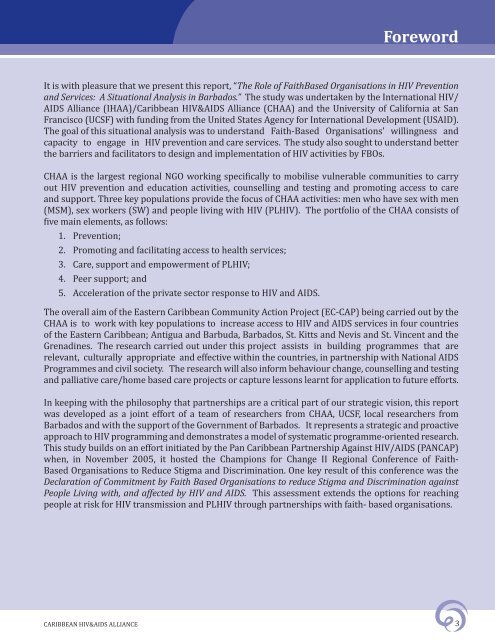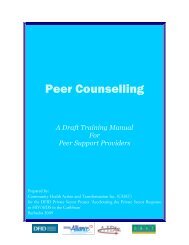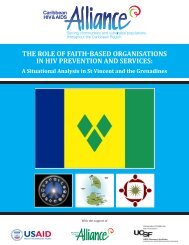the role of faith-based organisations in hiv prevention and services
the role of faith-based organisations in hiv prevention and services
the role of faith-based organisations in hiv prevention and services
You also want an ePaper? Increase the reach of your titles
YUMPU automatically turns print PDFs into web optimized ePapers that Google loves.
Foreword<br />
It is with pleasure that we present this report, “The Role <strong>of</strong> Faith Based Organisations <strong>in</strong> HIV Prevention<br />
<strong>and</strong> Services: A Situational Analysis <strong>in</strong> Barbados.” The study was undertaken by <strong>the</strong> International HIV/<br />
AIDS Alliance (IHAA)/Caribbean HIV&AIDS Alliance (CHAA) <strong>and</strong> <strong>the</strong> University <strong>of</strong> California at San<br />
Francisco (UCSF) with fund<strong>in</strong>g from <strong>the</strong> United States Agency for International Development (USAID).<br />
The goal <strong>of</strong> this situational analysis was to underst<strong>and</strong> Faith‐Based Organisations’ will<strong>in</strong>gness <strong>and</strong><br />
capacity to engage <strong>in</strong> HIV <strong>prevention</strong> <strong>and</strong> care <strong>services</strong>. The study also sought to underst<strong>and</strong> better<br />
<strong>the</strong> barriers <strong>and</strong> facilitators to design <strong>and</strong> implementation <strong>of</strong> HIV activities by FBOs.<br />
CHAA is <strong>the</strong> largest regional NGO work<strong>in</strong>g specifically to mobilise vulnerable communities to carry<br />
out HIV <strong>prevention</strong> <strong>and</strong> education activities, counsell<strong>in</strong>g <strong>and</strong> test<strong>in</strong>g <strong>and</strong> promot<strong>in</strong>g access to care<br />
<strong>and</strong> support. Three key populations provide <strong>the</strong> focus <strong>of</strong> CHAA activities: men who have sex with men<br />
(MSM), sex workers (SW) <strong>and</strong> people liv<strong>in</strong>g with HIV (PLHIV). The portfolio <strong>of</strong> <strong>the</strong> CHAA consists <strong>of</strong><br />
five ma<strong>in</strong> elements, as follows:<br />
1. Prevention;<br />
2. Promot<strong>in</strong>g <strong>and</strong> facilitat<strong>in</strong>g access to health <strong>services</strong>;<br />
3. Care, support <strong>and</strong> empowerment <strong>of</strong> PLHIV;<br />
4. Peer support; <strong>and</strong><br />
5. Acceleration <strong>of</strong> <strong>the</strong> private sector response to HIV <strong>and</strong> AIDS.<br />
The overall aim <strong>of</strong> <strong>the</strong> Eastern Caribbean Community Action Project (EC‐CAP) be<strong>in</strong>g carried out by <strong>the</strong><br />
CHAA is to work with key populations to <strong>in</strong>crease access to HIV <strong>and</strong> AIDS <strong>services</strong> <strong>in</strong> four countries<br />
<strong>of</strong> <strong>the</strong> Eastern Caribbean; Antigua <strong>and</strong> Barbuda, Barbados, St. Kitts <strong>and</strong> Nevis <strong>and</strong> St. V<strong>in</strong>cent <strong>and</strong> <strong>the</strong><br />
Grenad<strong>in</strong>es. The research carried out under this project assists <strong>in</strong> build<strong>in</strong>g programmes that are<br />
relevant, culturally appropriate <strong>and</strong> effective with<strong>in</strong> <strong>the</strong> countries, <strong>in</strong> partnership with National AIDS<br />
Programmes <strong>and</strong> civil society. The research will also <strong>in</strong>form behaviour change, counsell<strong>in</strong>g <strong>and</strong> test<strong>in</strong>g<br />
<strong>and</strong> palliative care/home <strong>based</strong> care projects or capture lessons learnt for application to future efforts.<br />
In keep<strong>in</strong>g with <strong>the</strong> philosophy that partnerships are a critical part <strong>of</strong> our strategic vision, this report<br />
was developed as a jo<strong>in</strong>t effort <strong>of</strong> a team <strong>of</strong> researchers from CHAA, UCSF, local researchers from<br />
Barbados <strong>and</strong> with <strong>the</strong> support <strong>of</strong> <strong>the</strong> Government <strong>of</strong> Barbados. It represents a strategic <strong>and</strong> proactive<br />
approach to HIV programm<strong>in</strong>g <strong>and</strong> demonstrates a model <strong>of</strong> systematic programme‐oriented research.<br />
This study builds on an effort <strong>in</strong>itiated by <strong>the</strong> Pan Caribbean Partnership Aga<strong>in</strong>st HIV/AIDS (PANCAP)<br />
when, <strong>in</strong> November 2005, it hosted <strong>the</strong> Champions for Change II Regional Conference <strong>of</strong> Faith‐<br />
Based Organisations to Reduce Stigma <strong>and</strong> Discrim<strong>in</strong>ation. One key result <strong>of</strong> this conference was <strong>the</strong><br />
Declaration <strong>of</strong> Commitment by Faith Based Organisations to reduce Stigma <strong>and</strong> Discrim<strong>in</strong>ation aga<strong>in</strong>st<br />
People Liv<strong>in</strong>g with, <strong>and</strong> affected by HIV <strong>and</strong> AIDS. This assessment extends <strong>the</strong> options for reach<strong>in</strong>g<br />
people at risk for HIV transmission <strong>and</strong> PLHIV through partnerships with <strong>faith</strong>‐ <strong>based</strong> <strong>organisations</strong>.<br />
CARIBBEAN HIV&AIDS ALLIANCE 3






